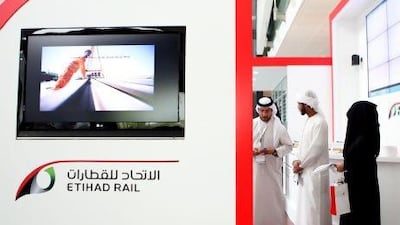Etihad Rail plans to build a terminal at Dubai Industrial City in a move that could help to create one of the emirate's biggest freight hubs.
The developer of the UAE's rail network and Dubai's second-largest industrial centre signed an initial agreement for the construction of a public freight terminal yesterday.
The station will connect DIC to the country's other major industrial and logistics hubs as it emerges as an automotive logistics centre.
The agreement would help to enhance "the country's position as a logistics hub by concentrating all types of cargo in one strategic location", said Nasser Al Mansoori, the chief executive of Etihad Rail.
The company plans to lay about 1,200 kilometres of track by 2018. A first phase, a 264km stretch between Habshan and Ruwais that will transport sulphur from inland gas facilities to the coast, is due to be completed this year.
The planned terminal paves the way for the destination to become the centre of non-bonded (non-free zone areas) transport in Dubai, Etihad Rail said in a statement.
The terminal in DIC would be part of the second phase of development, 628km of track that will connect all major cities, transport and industrial hubs in the Emirates, and link the country to a region-wide rail network via Saudi Arabia and Oman. Tenders for the construction have been submitted, and the contracts are expected to be awarded before the year is out.
With the completion of the second phase, DIC will be linked by rail to the ports of Jebel Ali, Mussafah, Fujairah and the Khalifa Port in Taweelah.
"Connectivity is essential for manufacturing and logistics businesses," said Abdulla Khalifa Belhoul, DIC's chief executive. "I am confident that Dubai Industrial City will see further growth following the delivery of this rail station, as it provides additional opportunities for companies, investors and the labour force."
The industrial park comprises 55 square kilometres. Plans for the rail terminal include extensive container, automotive and bulk-handling facilities. DIC is positioning itself as an automotive hub, with local car dealers Al Rostamani Group, Gargash Motors, Al Habtoor Motors and Al Nabooda Automobiles all using it as a logistics centre.
The station could help in expanding their DIC operations to cater to international markets.
"We look forward to exploring opportunities with its growing portfolio of customers from the automotive industry," said Mr Al Mansoori.
The rail terminal is widely expected to help to grow the industrial park.
"Any primary rail station has an effect on the market around it," said Ian Albert, the managing director for the property company Colliers International in Dubai.
"If it's a transit route for goods, then there will be a significant improvement."
Saudi Arabia is currently the only Arabian Gulf country with a sizeable railway network. About 1,300km of track connects Riyadh to the kingdom's oil hubs, and the government has plans to build a further 5,000km by 2025. Like Etihad Rail, it will be part of the GCC network that will help to speed economic integration within the region.

